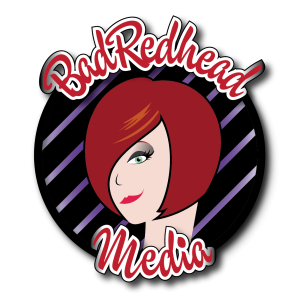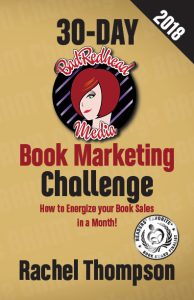This is the Reason Content Marketing for Writers Matters
Content marketing. It’s not a term most writers are familiar with, likely because anything with the term ‘marketing’ in it makes us want to run away and cower in the safety of our tried and trusty pens and pads.
Besides, we are writers. We want to create art. Why do we need to do any of that business stuff? Writers write. Right?
Well. In case you haven’t heard, publishing is a business. Most authors (and publishers) want to actually, you know, sell books and shit. See their books in a bookstore. Sit on Oprah’s couch. Come on, you know you’ve had those dreams. We all have. How are you going to get there if readers don’t know about your work? You guessed it: marketing.
There are many, many aspects of book marketing, of course, which I discuss here in my blog posts, my book The BadRedhead 30-Day Book Marketing Challenge, weekly on #BookMarketingChat (every Wednesday on Twitter at 6pm pst/9pm est), and across my various social media channels, articles on various online publications, and guest posts. I also recommend reading the outstanding work of Aaron Orendorff (my most recent #BookMarketingChat guest), Joanna Penn, and Jane Friedman. All are amazing.
In my almost ten years in this industry, I’ve found writers typically fall into three categories:
- The Non-Marketer: I just want to write. Marketing is stupid and I refuse to do it. Besides, don’t publishers do that stuff anyway? I’ll leave it to them.
- The Sort-of Marketer: I know I need to market but it’s so overwhelming, I don’t know where to start. I have Facebook. Does that count?
- The Gung-Ho Marketer: I’m all over this marketing thing! I have accounts everywhere and talk to everyone. Woohoo!
There are pros and cons to each of these categories, and content marketing can fit within each. Let’s deconstruct.
What is Content Marketing?
First, let’s discuss content marketing. What is it and why does it matter for authors? Here’s a great definition:
At its root, content marketing boils down to sharing real solutions to real problems for real people – and doing it for free ~ Aaron Orendorff
Content takes many forms, such as social media posts, sharing articles of interest, promotions, email marketing, books, courses, webinars, podcasts, and blogging. Ask yourself: how will this help my reader?
That’s the basic concept of content marketing. It’s not about YOU, it’s about THEM. Sure, from a self-centered perspective, we think our books will help or be of benefit to everyone (regardless of genre) — which often leads to “Buy my book!” spamming, unfortunately. But remember, everyone is not your demographic. What to do?
- Research and strategically identify your reader demographic (here’s how),
- Build relationships with those readers, and
- Effectively and organically build your fan base.
Non-Marketing
“I just want to write. Marketing is stupid and I refuse to do it. Besides, don’t publishers do that stuff anyway? I’ll leave it to them.
We are creatives, and we pour our heart and soul into creating our book, making it the absolute best it can be (and if you haven’t, go back and start over). Of course, we want to share it and let the world know about it, right? Not so fast.
The non-marketer will fight you on this concept with their entire being. They will insist:
- their genre is saturated,
- social media is for kids,
- email marketing is dumb,
- blogging is a waste of time,
- marketing is supposed to be done by the publisher
(writers tell me all of the above daily, even those who aren’t published).
Many (who have the dough) will pay someone to set up a beautiful website, pay thousands for gorgeous covers, even hire top NYC PR firms to arrange book tours and signings, and maybe even pay someone like me to set up their social media accounts, then refuse to do anything beyond that. Their platform languishes, then dies. So do their sales.
I hear and see this daily from authors, publishers, and even clients. As a marketer, going on almost gosh, thirty years now (starting in Big Pharma back in 1987), I cannot comprehend this passivity. You have a product, you market the product. You have a book, you market the book.
But hey, sometimes it’s not simply about passivity, it’s about a lack of marketing knowledge, understanding of the publishing industry, real life, health issues, desire, and let’s face it, time. Not everyone is able to go full commit to the business of BEING AN AUTHOR beyond writing, and it is what it is. Beyond that, many writers are unconvinced that having a robust author platform works for book sales (I’m not sure they’ve done much research into this, but that’s another post).
In fact, a few authors have downright confronted me, demanding I prove to them with hard data that ‘this many Twitter followers’ will result in ‘this many book sales.’ Yea, it doesn’t work that way.
Pro: This type of writer is typically fairly prolific since they can’t be bothered to interact or focus on readers or marketing. Their goal is strictly writing and writing only. The work is the thing and the only thing.
Con: Lack of a dedicated fan base, SEO and visibility, and any real connection to readers.
So, how can the non-marketer still participate in any meaningful way in marketing their work?
- First, they have to have a modicum of desire to connect with readers. Without that, why bother? Content marketing isn’t difficult or time-consuming (though it will take a few minutes a day).
- Second, by using a social media management tool like Buffer or Hootsuite (there are many others as well, though I like these two and they have free options to start), it’s easy enough to find articles to share that help others within your areas of interest, and share them regularly on a schedule. You can read more about how to do that here.
Sharing articles, guest posts, blogs, etc., mixed in with occasional, and not exclusively, book promotions show your readers that you are interested in them, and in something besides blasting “Buy my book!” tweets and posts. It’s not all about you, all the time.
Tip: Take advantage of memes like #MondayBlogs and #ThursdayWrites on Twitter to share not only your own blog posts and guest articles but others’ as well. This means you’re not sharing book promotion, it’s not exclusively ‘all about you,’ and you’re helping others, too. AND, you can schedule those posts by using the social media management tools mentioned above.
Sort-of Marketing
“I know I need to market but it’s so overwhelming, I don’t know where to start. I have Facebook. Does that count?”
This is the majority of writers, either pre or post-release. They understand the need to market their books but aren’t sure how, or when, to start. They likely have:
- Facebook (don’t we all?), but probably only a personal account, not an author page (or realize why they must have one).
- A Twitter account but rarely use it;
- Same with Pinterest and/or Instagram, and don’t know they need business accounts on each or why.
- They still think Google+ is a joke.
- They think blogging is optional, and probably have a free website on Blogger or Wix, and don’t own their domain.
- Don’t guest blog or pitch articles to publications.
- Don’t focus on growth
These are not criticisms. With the exception of diving into Twitter back in 2009, I was pretty much the same. We all learn as we go. Besides teaching, the highest form of learning is doing. This is why I started this blog, my business, and wrote my 30-Day Book Marketing Challenge and sell it for five bucks — to help authors learn all this stuff quickly and practically as they do it themselves.
Pro: This type of author is willing and able to learn, which is great! I love working with this author. They see the benefit of developing an author platform, and how content marketing is a crucial part of connecting with readers. This author needs to start slow and go slow. Like any adult learner, they must see the benefit and the payoff of the activity involved or they’ll bail.
The other crucial component here is to understand that it’s not what they, the author, are most comfortable doing, but discovering where their readers are and connecting with them there, e.g., if their demographic skews younger, then Instagram and Pinterest are probably a better use of their time than Facebook.
Con: This author tends to stay where they are comfortable. Change is scary. Facebook is easy, so that’s where most authors congregate. Unfortunately, most authors are chatting with other authors on Facebook — how many other authors are truly your demographic? (Real-Life Example: In my case, they’re a good portion because authors are my demographic for my 30-Day Book Series; not so much for my Broken Series, where I focus more on connecting with survivors and women).
So, how can the Sort-Of Marketer participate in marketing their work?
- Go where your readers are. Learn those channels and participate actively in providing content that helps your readers.
- Actively and consistently blog. Participate in the memes mentioned above.
- Growth. Often overlooked, actively grow your channels (e.g., Twitter, G+, Facebook, Instagram), but be strategic by only connecting with your demographic. Again, everyone is not your reader.
- Listen and ask questions. Social media is great for market research. What do your readers want? Ask them!
Gung-Ho Marketing
“I’m all over this marketing thing! I have accounts everywhere and talk to everyone. Woohoo!”
This author is the social butterfly of the publishing world — pretty much everywhere. They interact, they’re generous, and fun to be around. What’s not to like?
The problem here is a distinct lack of focus. They might be on each social channel, chatting away, twittering away their days, commenting on everyone’s Facebook walls, networking like crazy, blogging occasionally, maybe jumping into a promotion here and there and ooh, signing up for that newsletter thingy…but, what is their goal?
- To sell books?
- To create long-lasting relationships with readers, book bloggers, reviewers, and other publishing influencers?
- To up their SEO and Google Ranking?
In truth, they probably don’t know. Why? Because they have no plan. They’re just out there having fun! And that’s cool. Some people fall into social media and building relationships by the seat of their pants and their charming personality. Some people just have that It Factor. We know it when we see it, and we fall under their spell. They are great writers and one interaction with them and BAM! We scramble to click on their book link and buy their books.
How often does that happen, though? For me, that’s pretty rare.
Pro: This author is easy to find, social, and attracts attention easily. Readers want to learn more about them in an organic way based simply on their manner and interactions.
Con: They usually don’t write a lot, and are banking on one or maybe two books for their windfall. Their branding can be inconsistent, they don’t follow a set posting schedule on social media or blogging, which makes it difficult to plan promotions or participation in blog memes. Content marketing goes out the window because it’s haphazard at best.
So, how can the Gung-Ho Marketer participate in marketing their work?
- Write a book marketing plan and stick to it. Alternatively, create writing and marketing goals (weekly, monthly, quarterly), and hold yourself accountable.
- Use a social media management tool that allows you to schedule and live interact (I recommend Hootsuite). This is great for scheduling content (articles, blog posts, quotes, visuals, promos), and still chat with folks, focusing on content marketing that helps your readers.
- Remember that social media is only one part of your author platform — branding across your entire platform helps manage expectations for readers and helps you know exactly what you’ll be focused on also (more on author platform from Jane Friedman here).
Final Thoughts
Changing our paradigm from “I just want to write,” is hard. I get it. If you don’t care if anyone reads your books, cool. For many writers, it’s not about money, or about being read, it’s the amazing experience of writing and creating — which is pretty damn awesome. If, however, you want people to read your work, you want to bond with people over shared experiences, you want to make some bank…whatever your goal is that requires eyes on your work, there is no getting around the fact that you must learn how to market your book (or hire someone to do it for you).
**A note on hiring people to market your work: yeah, that’s what I do for a living, so it’s in my best interests to say ‘Hire me!” but I’m not going to do that. That’s not the purpose of this post. The purpose of this post is to tell you that you can learn how to do much of this yourself by reading my posts and the experts I mention here. Only you know your work intimately.
If you can’t, then yeah, hire me or someone like me who’s been there and done it. Don’t hire someone off Fiverr whom you don’t know, or who will promise you 25K fake followers to falsely inflate your numbers. Get a personal recommendation and ask for references.**
Work smart and you will reach your goals, whatever they may be!
For a more detailed plan on developing your book marketing, purchase Rachel’s new book, The BadRedhead Media 30-Day Book Marketing Challenge now on Amazon!
Already a 5-Star Reader’s Favorite!



Hi, Rachel.
You are 100% right in your categorizing the blog writers. For me, the most difficult, I found to be, the way I can get across and make myself understood.
Hi, Igor!
It can be difficult to dedicate ourselves to blogging — that’s where branding comes in. Know exactly what your message is (see my articles here on branding to help with that), and be consistent with your message.
Then, create a blogging schedule and stick to it. You got this. 🙂
[…] Let’s take a look at what content marketing is and how to use it for effective book marketing. […]
Thanks for a great overview (and lots of detail, too) Rachel. Excellent strategies here and I love the clarity around the distinctions between the different types of author/marketers. So very true and how important that we meet them wherever they are and help them to build some visibility for their work. Tweeted and bookmarked this one to share with others. Great stuff!
Hi, Deb!
Thank you for reading and for the feedback. I’ve been every one of these marketers, LOL. Depending on the day, I still am. We can’t be ON all the time, so it’s important to have a plan to fall back on. That’s why knowing what our keywords are, where to find content, and consistently sharing (and using a social media management tool to make it easy) are so important.
Appreciate the shares, thank you!
[…] discussed content marketing here and on the recent #BookMarketingChat with Aaron Orendorff (links provided so review both if you […]
[…] all know that Amazon lets you plug in keywords — seven to be exact — in order to help readers find your books. But, […]
[…] A fellow writer friend of mine, @iconicontent has a fun series called #LetsGetRejected, he embraces […]
Rachel,
you really nailed the writer types. As a book publisher and publicist, I see them all. You give great advice to all of them. I would add that the non-marketer and the sort of marketer would benefit from a basic overview of book marketing and author platform building – as NY retailer Syms ad slogan stated, “An Educated Consumer is our Best Customer” – how else would you really know who to hire, or what to hire them for for your book promotion and sales?
I just had a convo with an author who had hired a few people to do various aspects of platform building/marketing, wasn’t sure what each of them was doing… there was no coordination between the efforts being made on her behalf….
Thank you for the comments and feedback, Jane! I hear that SO often, with regard to coordination. There ARE many moving parts — I usually recommend having one social media manager who can also project manage all those other folks, and a PR person who can do that traditional PR. Otherwise, authors CAN do it themselves as long as they do the work and learn what works most effectively for their personal brand.
It’s not impossible! Just takes some time to learn. Like anything worth doing :).
It’s good to be here in this blog. I learned a lot here and the write up was informative. Content is as important as Gold when it comes to online marketing. With the best writing service, you can have great content and achieve high ranking position on the web. This is really a good list, keep posting!